SEO
8 Content Writing Tips From Experts In 2023

The digital market is volatile and ever-changing.
Everyone is competing for popular keywords, and artificial intelligence is changing content creation.
It can be a bit daunting, especially if you’re new to content writing.
So, how can you cut through the noise and write more effective content in 2023?
We’ve asked 17 industry professionals to share the wisdom they’ve learned over the years, their advice to those trying to find their way into content marketing, and their favorite tools for writing and optimization.
Julia McCoy, VP of Marketing at Content at Scale, would have told her younger self to realize the opportunity.
“It was hard to see it back then since I was at ground zero,” recalls McCoy.
“But the industry of content marketing itself had ballooned by billions of dollars since when I started. This would have given me more hope and excitement that what I did truly mattered to building not just income, but a legacy.”
Without further ado, here are their top tips:
1. Focus On Your Audience
Jamie Press, Digital Marketing Specialist At Eurisko
The best tip I can give a copywriter is to think “audience first.” This advice is straight from Brian Clark, founder of Copyblogger.
Sometimes, we go straight for the keyword tools when we’re brainstorming a piece of content; however, if we don’t know who we’re writing for, our copy won’t resonate with the reader.
Dialing into our target audience and their pain points (specific problems our audience needs solving) is the first step.
Carlijn Postma, Brand Strategist, Speaker, and Author of “Binge Marketing”
One: Start bingeing.
Really? Yes. The first educational go-to database is your streaming service.
The best writers and content creators are the creators of films and series. They know how to attract and retain an audience by creating a compelling story.
And bring your notebook.
Two: Know the difference between a target group and an audience.
In content marketing, your goal is to communicate through text, video, or audio. Therefore, you need readers, viewers, and listeners. That is an audience.
There is a huge difference between a target group and an audience.
A target group is pointed out by you as the sender of the content (whether this target group likes it or not).
An audience decides for itself if it wants to be your audience. I prefer to reach and engage an audience over a target group.
Focusing on an audience will make you a better writer.
 Image credit: Carlijn Postma, January 2023
Image credit: Carlijn Postma, January 2023Three: Always create content in series.
Now, if your goal is to attract and retain a loyal audience, you have to start creating content in series.
With only one episode, one piece of content, you just won’t be able to build an audience.
And if you are creating a series, learn from the masters: use cliffhangers at the end, and recaps at the start of an episode.
Ask yourself: “What does my audience need to know about what I wrote in previous episodes to understand this one?” This signals your audience to consume the other episodes, too.
Linda Pophal, Founder At Strategic Communications, LLC
Focus on your audience and their needs and interests – that’s all that really matters.
If you write for your audience and work to address the questions they might have, you will automatically create SEO-friendly content, because that’s what SEO is all about.
Even when my clients have specific SEO requirements, I first write the copy as I had always written it, long before SEO existed – to meet my audiences’ needs.
Then I’ll go back and “retrofit” the keywords that clients have requested; often, they’re already there and may just need to be tweaked or added to a bit.
2. Choose Quality Over Optimization
Steph Andrusjak, SEO Consultant
Always write with the user in mind, even when optimizing for search engines.
You can optimize an article by using keyword tools, like KeywordTool.io or AlsoAsked, to find what queries people are searching to help you mold your article – but don’t let the quest for optimization undo the quality of your writing.
If you’re writing content to sell something, then embrace copywriting formulas to create compelling statements.
If you’re writing articles of interest, then write in a way that the end user can relate to and explain the subject as fully as possible.
Most of all, write for your audience.
If your end users are teenagers, write in a style that will appeal to them without sacrificing the image you want to present.
If the website’s main customers are business owners, then opt for a more professional, formal tone.
Making sure your content is search engine optimized doesn’t necessarily mean you have to write thousands of words.
The key is that it needs to be as long as required for you to explain your point clearly and comprehensively. This means that content can be just as effective by writing concisely.
3. Build Out Your Content With Search Intent In Mind
Rudy Mawer, CEO At Mawer Capital
When you are just beginning your career in SEO writing, don’t forget that you write for both Google and the people who use it.
Keep these two equally important audiences in mind to maximize visibility and reach.
Quality content is essential, and Google knows this. It is pushing your content out to the world through its platform.
The better content that Google provides its users, the more likely people will use Google when they have a question.
It is essential to understand the keywords you are writing for and be able to talk about them dynamically.
You want your writing to be engaging, informative, and relevant for the reader.
Adam Berry, SEO Consultant At Adam Berry SEO 
I would definitely urge my former self to write for humans, not robots!
I’ve learned that it’s important to take the time to craft meaningful sentences that are interesting and engaging to readers.
This means writing with more details and facts to provide context, as well as aiming for greater semantic richness.
For example, instead of simply stating a fact or opinion, try elaborating on why it’s true, or how others may feel about it, to draw readers in.
By taking this approach, I found that readers were more likely to connect with my content and leave feeling enriched by the experience.
Joe Karasin, CMO At CircleIt And Head Of Growth Marketing At DigitalWill.com
One: Don’t let the new focus on AI-driven content deter you.
AI content may get technical points and be produced more quickly, but creating compelling content is something that is still a human endeavor.
At the end of the day, the search intent of most users will favor the content that holds interest, which as of right now, AI hasn’t shown it can do.
Two: Balance is key.
You might be able to craft a beautiful story with your content, but if it isn’t written with SEO in mind, it won’t rank.
However, if you write a bunch of SEO-friendly content that is boring, no one will want to read it, and it won’t rank.
Being focused on the balance is the way you will gain readers and traction in your career.
Three: Write about what people want to read.
If you are writing content for a company, you want to look at the real-life applications of the company’s products and services.
By putting the customer or reader in the central piece of your narrative, you will get others to read it and identify with the “hero” of your story.
For example, if you have created a new technology, don’t just write a post about the features. Talk about the users and how the features you want to write about are improving their lives.
Sherry Bonelli, Owner Of Early Bird Digital Marketing
If you are just starting in the writing industry, I first recommend following Ann Handley and getting a copy of her “Everybody Writes” book.
Ann is an amazing writer that gives you writing tips that you can use whether you’re tasked with writing blog posts, website content, email newsletters, social media posts, ads – or anything in between. Plus, she has a great sense of humor – so she’ll make you laugh as you learn to be a better writer!
Now, when I began my writing career, I was very lucky to have a solid SEO foundation under my belt.
But looking back, I focused too much on writing for individual keywords when I should’ve spent more time writing about the topics people were searching for.
As a writer, create content about the topics people are searching for and then do more extensive keyword research about the questions people ask about the topic (and subtopics) you’re writing about.
Make sure you answer those questions thoroughly in your content. That’s the way to make your readers – and Google – happy!
4. Consider Using AI Writing Tools, But Use Them Wisely
Julia McCoy, VP Of Marketing At Content At Scale
We live in a completely new era versus the one I started in.
Today, the baseline of human content production can be assisted, if not nearly replaced, by AI tools built on top of OpenAI’s game-changing GPT language releases to write and create content.
With GPT4 on the horizon and about to launch, human content production will shift forever into an AI-assisted one.
That said, if you’re considering a writing career, don’t think there’s no need for the human. There’s a huge need for your writing skills.
It will just look different than when I started – when it was solely human-based.
My tips for you: Learn how to incorporate AI writing tools into your process. Learn how to edit, cut the fluff, and make the content that AI produces better. Learn strategy.
These skills will put you in a place where you cannot be replaced by AI.
Cai Ellis, SEO Manager At ToolTester
Now is not the time to completely move over to AI writing tools.
Although Google hasn’t come out and said that AI content is bad, we know that it prefers content that’s written by people for people.
With that said, it wouldn’t hurt to learn how to optimize AI content so that it’s a skill you can call on as and when needed.
We will likely see this as something that’s specifically needed from marketers in no time.
You could have a trial run of ChatGPT at home, focusing on the creation of content that’s helpful and user-first using the tool’s text as a starting point.
Other than that, the number one lesson for any new writer would have to be not to put themselves under too much pressure.
It takes time to learn how to craft the types of content that will engage and persuade.
It’s advisable to keep writing as a side hustle until you’re confident of meeting and exceeding client expectations.
Shubham Bajaj, Founder And SEO Scientist At Netsurge Technologies
With the onset of various AI writing tools and ChatGPT, it’s important for content writers who are just getting started to be able to write in a way that differentiates them from machines.
Adding your personality and character to your write-up and telling engaging stories that can keep the reader hooked are important aspects.
It is also important to note that, while it’s good to be quirky and conversational, make sure you have an NLP-friendly section that defines or provides an exact answer for the query in a format that Google or other search engines can directly use to display as a snippet.
5. Practice Writing Regularly
Jason Hennessey, Founder And CEO At Hennessey Digital
Read widely and often to develop your writing skills and understand the various styles and forms of writing.
Then write every day, even if it’s just for a few minutes, to improve your writing discipline and practice your craft.
Lastly, seek feedback on your writing from others, and be open to constructive criticism.
Alex Valencia, President At We Do Web Content
If I could give my past self a piece of advice, it’d be to brush up on grammar and style rules.
For style, there’s nothing better than reading works by your favorite authors. How do they describe everyday things and situations? How do they craft sentences? What about their storytelling that hooks you in?
Then, practice, practice, practice.
Sam Hollingsworth, SEO Director At Moving Traffic Media
Write more often and be less scared.
Like so many other things, we get better at writing the more that we do it (and reading).
It allows us to learn new things, experiment with new processes, and expand our skills for everything from creativity to accuracy and even speed and efficiency.
Dvir Ben-Aroya, Co-Founder And CEO At Spike
For those just getting started in their writing careers, reading widely can help you develop a strong writing style.
By reading various authors and genres, you can learn about different writing techniques and styles and find inspiration for your own writing.
Practicing regularly is also important, as it allows you to improve your skills and become more proficient in your craft.
Networking with other writers can also be beneficial, as it can help you learn about the industry, find potential collaborators or mentors, and stay informed about new opportunities.
And it’s also important to be open to constructive criticism because it helps improve your writing.
Rudy Mawer, CEO At Mawer Capital
If I could go back to the beginning of my writing career, I would tell myself that I need to spend more time reading and practicing different types of writing.
Even if you only write one specific style of writing, practicing different styles and formats of writing will strengthen your primary style by association.
It is a great mental exercise to sharpen and use the other “tools” in your writing toolbox.
For example, if you only write B2B long-form keyword-rich blog content, practicing creative writing every so often might be useful.
By doing so, you can combat writer’s block, gain additional perspectives, and have more engaging and dynamic content.
6. Find Your Rhythm And Style That Sparks Joy
Alex Valencia, President At We Do Web Content
When starting a career as a writer, it’s critical to uncover the type of writing that brings you joy.
The topics you cover should excite you, and crafting pieces should feel like a privilege.
It shows in your work when you have passion for the things you’re writing about. The energy is relaxed and confident.
Jason Hennessey, Founder And CEO At Hennessey Digital
Focus on developing your own unique voice and style.
Writing is a highly personal and subjective endeavor, and it’s important to find your own way of expressing yourself and telling stories.
This will set your work apart and make it more likely to resonate with readers.
Sam Hollingsworth, SEO Director At Moving Traffic Media
Never forget that writing is (seemingly) one of the most basic ways for humans to communicate.
Of course, like most everything in life, there are good and bad examples of it.
Be mindful of the foundational guidelines we’ve been told most of our lives but also do not lose out on creativity to do so.
I often think back to something one of my favorite journalism professors taught me (and of which he claimed one of his favorite professors taught him as a budding journalist): “Write like jazz.”
It should have rhythm, but also irregularities and improvisation that allow it to stand out. It should be enjoyable and digested with ease.
7. Learn To Overcome Setbacks And Imposter Syndrome
Kaitie Frank, Digital Marketing Copywriter At Page One Power

Imposter syndrome is real. Kick it out the door and have confidence in your writing!
Read examples of great work, then put your spin on it.
Also, triple edit:
- Edit on-screen.
- Print it out and edit.
- Have another set of eyes look at it.
Don’t let people bully you into submission. I spent too much time at a job where I was told I wasn’t good enough, and that made me lose confidence in my writing.
Instead, find a place where mentors help you grow and develop your skills, not knock you down because you don’t write exactly like them.
Dvir Ben-Aroya, Co-Founder And CEO At Spike
If I could go back to the beginning of my writing career, I would advise myself to be more persistent.
Writing is a challenging and competitive field, and it can take a lot of time and effort to succeed.
It’s important not to give up too easily and to keep working towards your goals, even when faced with rejection or setbacks.
8. Grow Your Network And Portfolio
Monika Nozinic, Copywriter at Async Labs
My advice to those who are just getting started in their writing careers would be:
- Read and study as much as you can. Look at the work of famous copywriters and see what you can learn from them.
- Write every day to develop your skills and build a writing routine. The more you write, the better you’ll get at it.
- Get feedback. Show your work to other people and see what they think.
- Learn SEO. Understanding SEO will help you to write copy that ranks well in search engines.
- Network with other writers and industry professionals.
- Know your audience. Understand who you’re writing for and what they need.
- Be adaptable. Copywriting constantly evolves, so be prepared to learn new things and adapt to new trends.
- Practice makes perfect. Keep practicing and experimenting until you find your voice and style.
- Learn about the industry you’re writing for. This way, you’ll be able to understand their language and speak to their pain points and goals.
- Be passionate. Copywriting is a creative field, so bring your passion for working, and it will shine through in your writing.
The advice I would now give myself at the start of my career would be to connect with other copywriters and content creators. Ask them to be my mentor for a week or two.
Also, I would tell myself to develop thicker skin and persistence, as rejection and criticism are a normal part of the writing process, which I learned, sometimes the hard way, along the way.
Adam Berry, SEO Consultant At Adam Berry SEO
Take time to build your portfolio.
You’ll want to start collecting samples of your work as soon as possible; these will be invaluable when applying for jobs or searching for opportunities.
Make sure each piece is polished and showcases your best writing ability.
Experts’ Favorite Tools For Content Writing And Optimization
Grammarly And Hemmingway
Alex Valencia’s top writing tool is Grammarly, and he says that “every professional should use it (#notanad).”
“It’s taught me a lot about my writing style and how to improve it. For keyword research, I use Semrush,” Valencia shares.
Shubham Bajaj suggests Grammarly and Hemingway “for avoiding grammatical errors and ensuring that your content is structured properly, especially when starting and you have a low to zero budget to spend on tools.”
“Once you have some budget to spend, consider subscribing to advanced tools like ProWritingAid,” Bajaj recommends.
Surfer SEO
“When it comes to writing tools, there are oodles of SEO tools out there that have content tools built in. (Some are definitely better than others.) One of my favorite tools for optimizing content is Surfer SEO,” says Sherry Bonelli.
“Surfer SEO takes the keyword you’re trying to optimize your content for and analyzes your content against the top-ranking webpages.
Then it shows All words and Natural Language Process (NLP) words so you can see if you’re overusing some words – or not using words that you perhaps should use. (Like maybe you didn’t even think about including a word or topic in what you were writing!)
Surfer SEO can really take your writing optimization to the next level. I’d highly recommend you play around with it.”
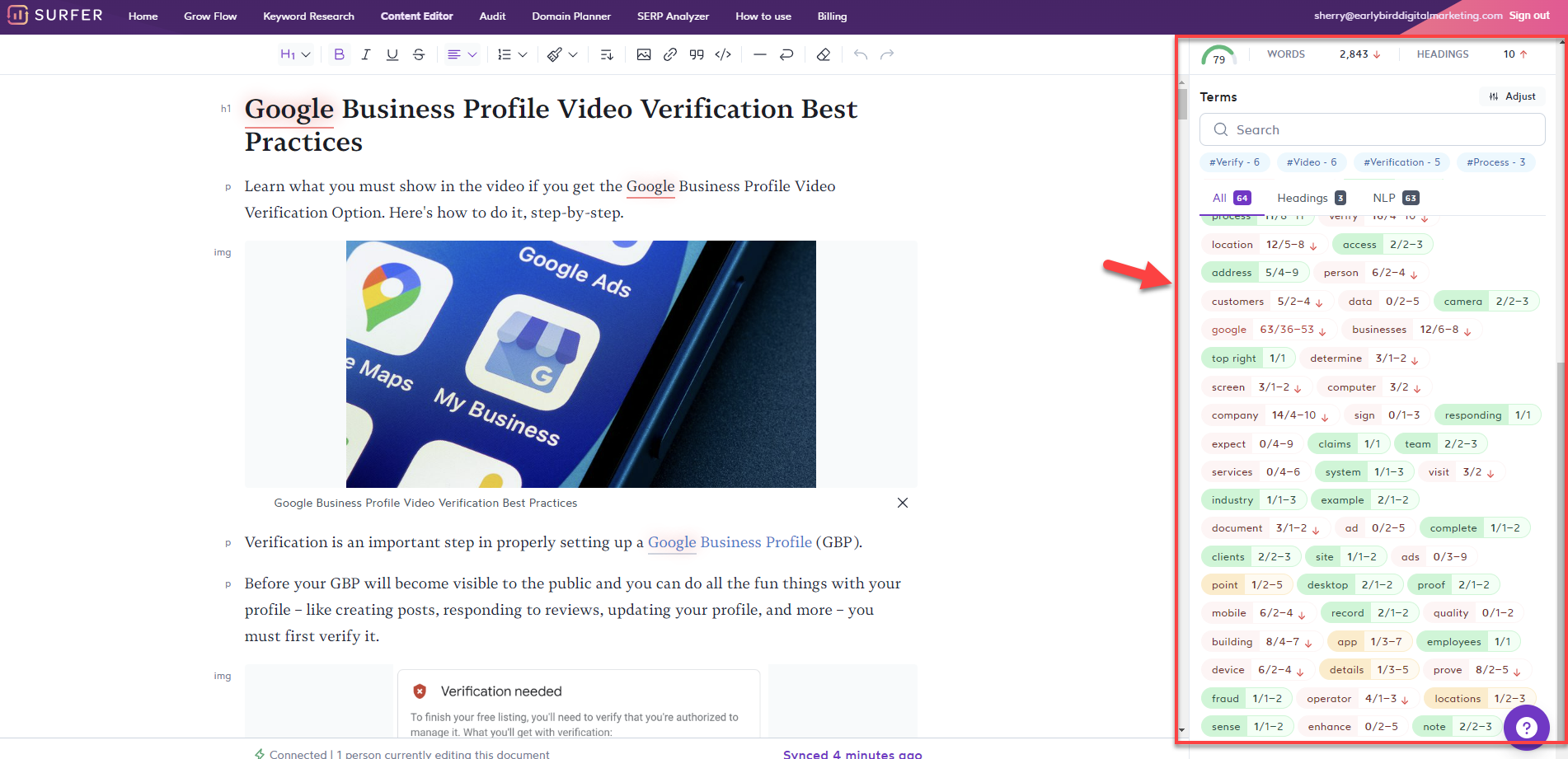 Screenshot from Surfer SEO, modified by author, January 2023
Screenshot from Surfer SEO, modified by author, January 2023“Don’t be afraid to use tools to your advantage,” advises Rudy Mawer.
“You are writing search engine-centric content; the internet has many resources and tools to help make your job easier and your writing more effective.”
Mawer loves using Surfer SEO as well. “Its content editor gives you a real-time score of your content’s strength for the keyword you are trying to rank for, NLP keyword suggestions, and a competitor analysis.”
Yoast SEO
Dvir Ben-Aroya’s favorite tools for content writing and optimization include Grammarly, Hemingway, Yoast SEO, and Google Analytics.
“Grammarly and Hemingway are writing tools that can help you improve your grammar, style, and readability.
Yoast SEO is a plugin that can help you optimize your content for search engines, and Google Analytics is a tool that allows you to track the performance of your content, including pageviews, bounce rate, and conversion rate.
These tools are very helpful in making your content more effective and engaging for your target audience,” explains Ben-Aroya.
Content At Scale
Julia McCoy saves up to seven hours per piece by using Content at Scale, “a long-form AI content writer that does everything for you – even SEO research and optimization.”
“It’s utterly insane to realize we’re here in an era where AI can replace hours and hours of grunt work at a fraction of the cost,” McCoy notes.
She also loves KWFinder for easy, simple, enjoyable keyword research and enjoys having ChatGPT for writing email outlines, topic ideas, and lists.
Otter.ai
Linda Pophal does a lot of interviews with subject matter experts and sources, and Otter.ai helps her accomplish the task.
“Otter.ai is great for recording and transcribing these interviews automatically so I can focus on what the sources are saying without worrying about missing anything,” says Pophal.
“I also like Grammarly, Hemingway App, and AP Styleguide online, and have begun experimenting a bit with ChatGPT, not to actually write my content but to help with outlining and getting a head start in fleshing out ideas,” she adds.
Cai Ellis finds Answerthepublic and Reddit great for content inspiration.
“If you’re writing on a niche topic, diving into that Subreddit is the best way to get authentic and unique insight quickly,” Ellis recommends.
Joe Karasin also uses Reddit and Quora for topic research and to learn what people are talking about surrounding your topics.
“There are probably questions your audience has that you haven’t even considered. Write about those topics, and you’ll experience success,” Karasin advises.
Google Search And Suite
Jamie Press goes for a simple Google Doc for writing and collaborating with colleagues and clients.
Kaitie Frank uses good ol’ Google for research and optimization.
She believes that the “SERPs (search engine results pages) will tell you all you need to know about which headers to use and which information to include.”
Sam Hollingsworth shares a similar outlook.
“Like many old-school journalists, I don’t rely too heavily on many tools to help me optimize content or even come up with ideas to write about, but it’s nice to have them when needed.
It’s amazing how much direction and ideas we can get from free resources like Google Keyword Planner, as well as traditional Google Search.”
“For help optimizing content, MarketMuse and Frase are great tools to have available in your efforts,” Hollingsworth adds.
Editor’s note: All interviews have been lightly edited for clarity, brevity, and adherence to our Editorial Guidelines. The views expressed by the interviewees in this column are theirs alone and do not necessarily represent the view of Search Engine Journal.
More Resources:
Featured Image: Roman Samborskyi/Shutterstock
SEO
How To Use ChatGPT For Keyword Research

Anyone not using ChatGPT for keyword research is missing a trick.
You can save time and understand an entire topic in seconds instead of hours.
In this article, I outline my most effective ChatGPT prompts for keyword research and teach you how I put them together so that you, too, can take, edit, and enhance them even further.
But before we jump into the prompts, I want to emphasize that you shouldn’t replace keyword research tools or disregard traditional keyword research methods.
ChatGPT can make mistakes. It can even create new keywords if you give it the right prompt. For example, I asked it to provide me with a unique keyword for the topic “SEO” that had never been searched before.
“Interstellar Internet SEO: Optimizing content for the theoretical concept of an interstellar internet, considering the challenges of space-time and interplanetary communication delays.”
Although I want to jump into my LinkedIn profile and update my title to “Interstellar Internet SEO Consultant,” unfortunately, no one has searched that (and they probably never will)!
You must not blindly rely on the data you get back from ChatGPT.
What you can rely on ChatGPT for is the topic ideation stage of keyword research and inspiration.
ChatGPT is a large language model trained with massive amounts of data to accurately predict what word will come next in a sentence. However, it does not know how to do keyword research yet.
Instead, think of ChatGPT as having an expert on any topic armed with the information if you ask it the right question.
In this guide, that is exactly what I aim to teach you how to do – the most essential prompts you need to know when performing topical keyword research.
Best ChatGPT Keyword Research Prompts
The following ChatGPT keyword research prompts can be used on any niche, even a topic to which you are brand new.
For this demonstration, let’s use the topic of “SEO” to demonstrate these prompts.
Generating Keyword Ideas Based On A Topic
What Are The {X} Most Popular Sub-topics Related To {Topic}?
The first prompt is to give you an idea of the niche.
As shown above, ChatGPT did a great job understanding and breaking down SEO into three pillars: on-page, off-page & technical.
The key to the following prompt is to take one of the topics ChatGPT has given and query the sub-topics.
What Are The {X} Most Popular Sub-topics Related To {Sub-topic}?
For this example, let’s query, “What are the most popular sub-topics related to keyword research?”
Having done keyword research for over 10 years, I would expect it to output information related to keyword research metrics, the types of keywords, and intent.
Let’s see.
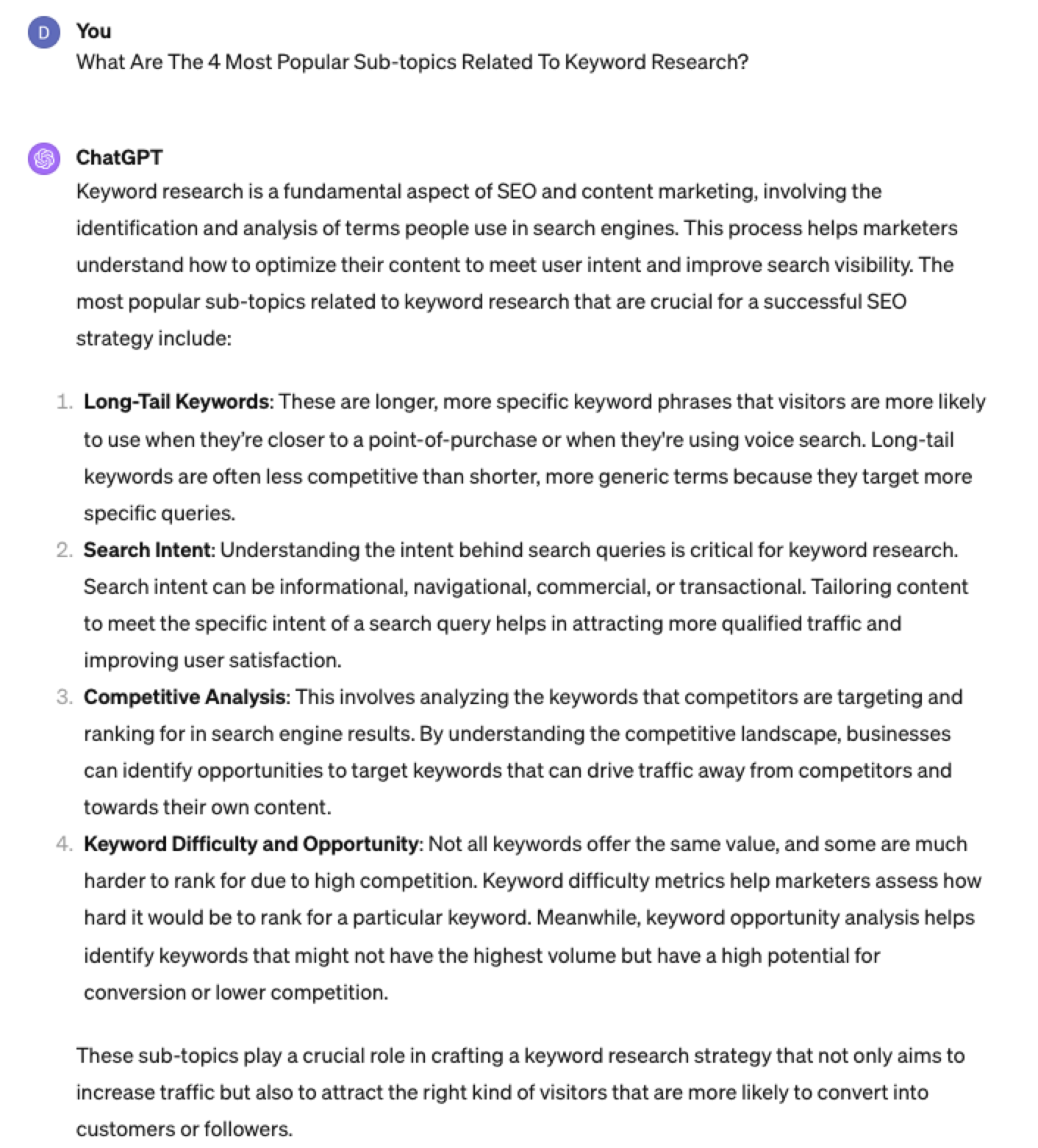 Screenshot from ChatGPT 4, April 2024
Screenshot from ChatGPT 4, April 2024Again, right on the money.
To get the keywords you want without having ChatGPT describe each answer, use the prompt “list without description.”
Here is an example of that.
List Without Description The Top {X} Most Popular Keywords For The Topic Of {X}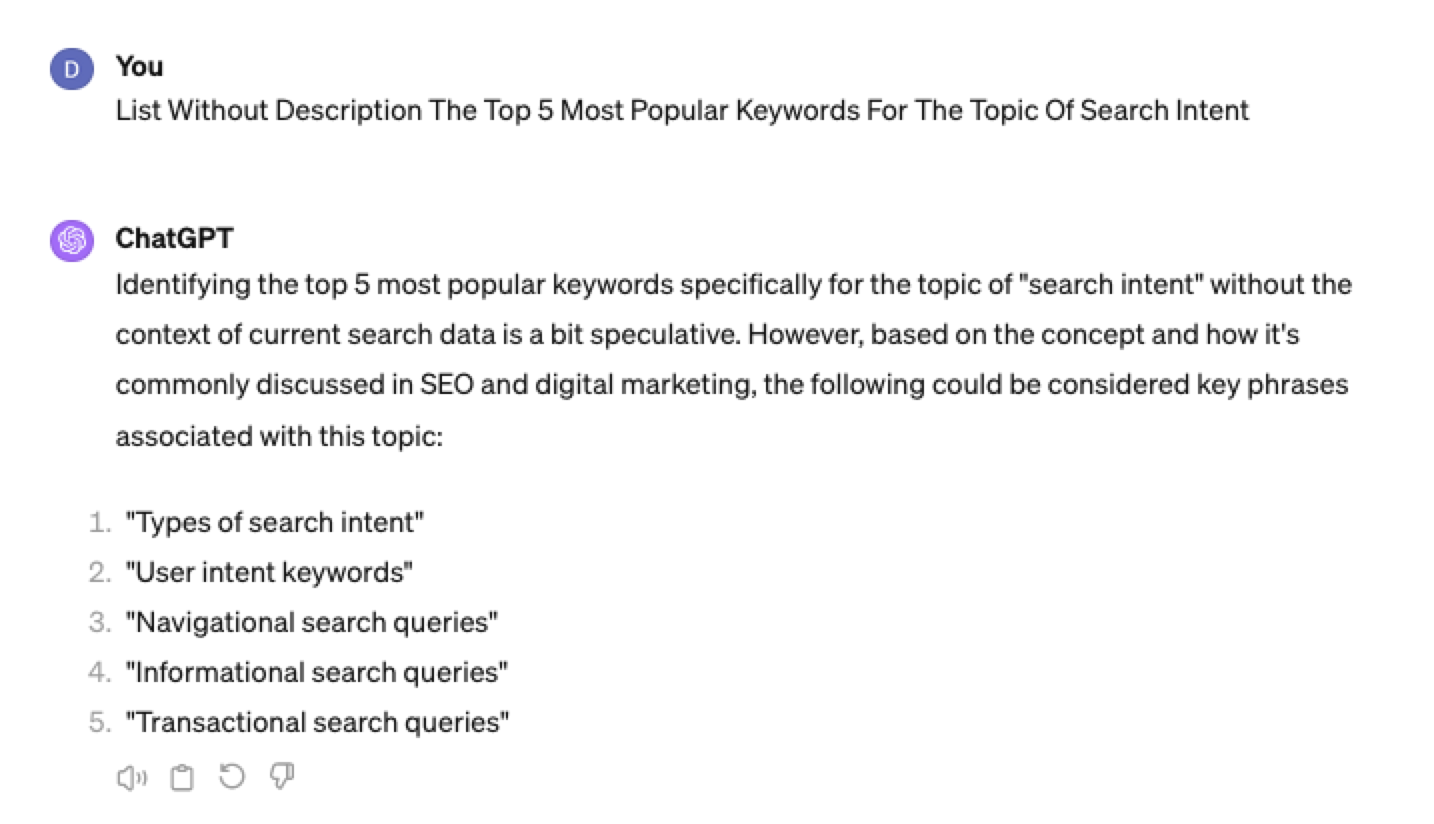
You can even branch these keywords out further into their long-tail.
Example prompt:
List Without Description The Top {X} Most Popular Long-tail Keywords For The Topic “{X}”
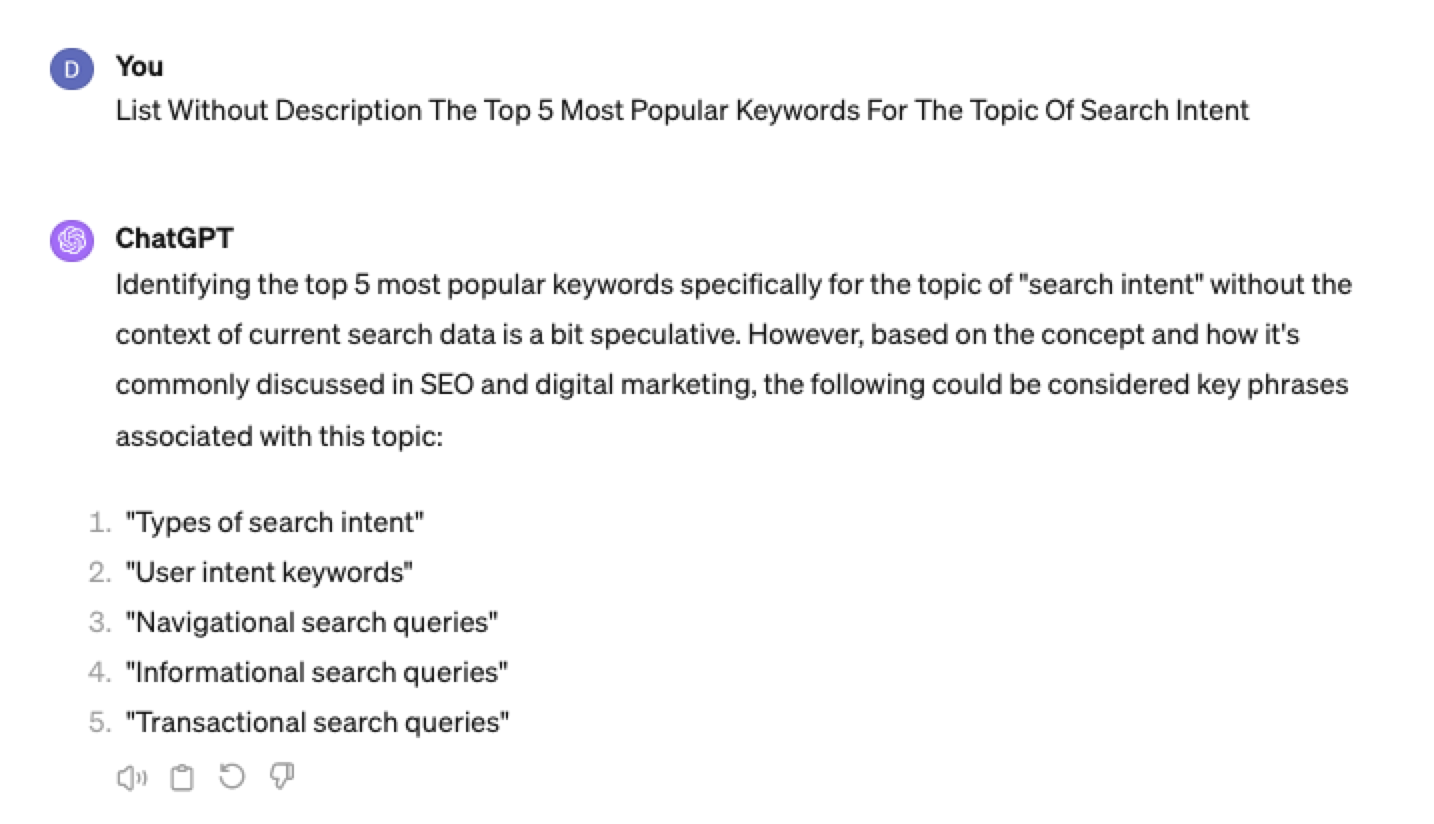 Screenshot ChatGPT 4,April 2024
Screenshot ChatGPT 4,April 2024List Without Description The Top Semantically Related Keywords And Entities For The Topic {X}
You can even ask ChatGPT what any topic’s semantically related keywords and entities are!
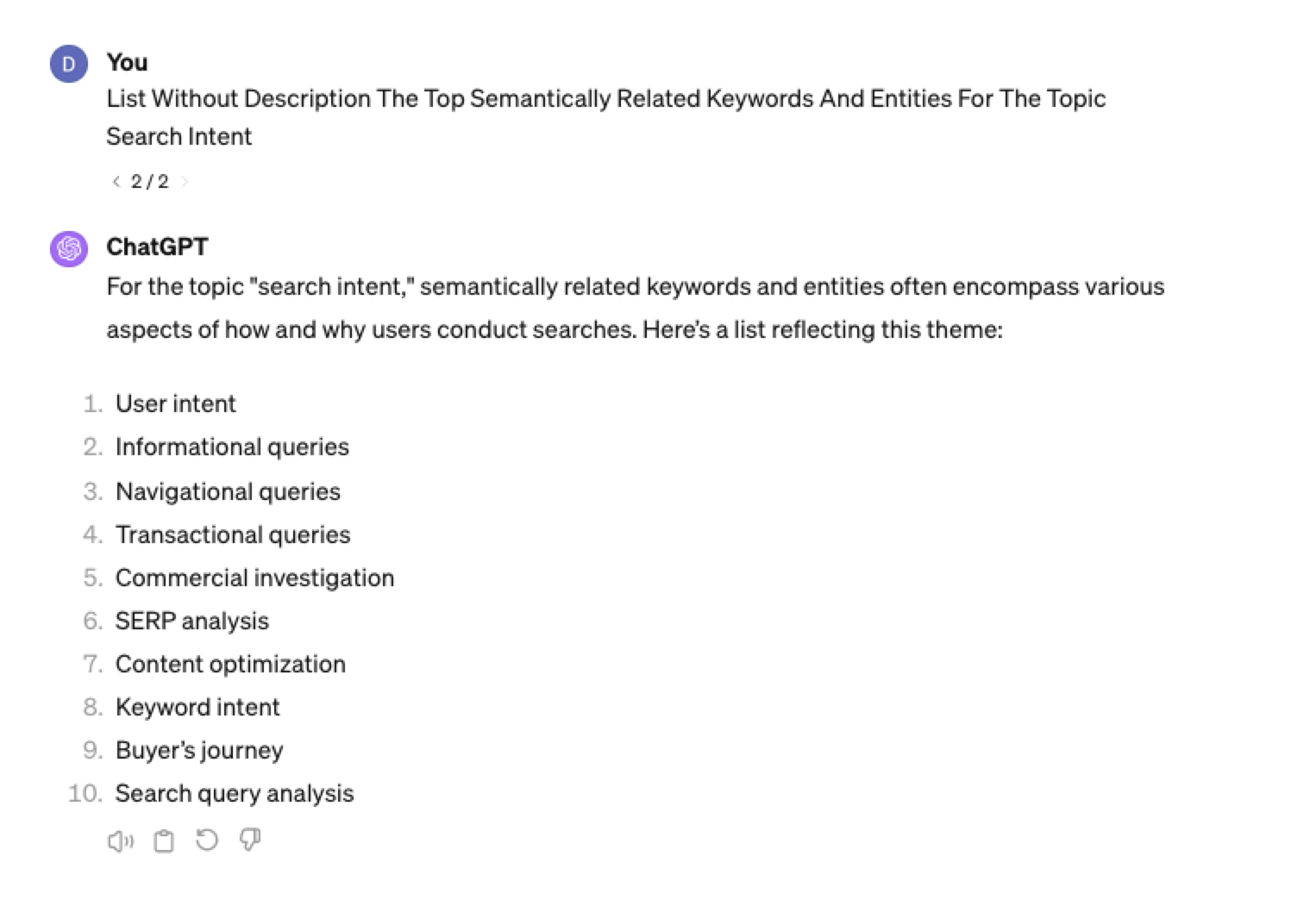 Screenshot ChatGPT 4, April 2024
Screenshot ChatGPT 4, April 2024Tip: The Onion Method Of Prompting ChatGPT
When you are happy with a series of prompts, add them all to one prompt. For example, so far in this article, we have asked ChatGPT the following:
- What are the four most popular sub-topics related to SEO?
- What are the four most popular sub-topics related to keyword research
- List without description the top five most popular keywords for “keyword intent”?
- List without description the top five most popular long-tail keywords for the topic “keyword intent types”?
- List without description the top semantically related keywords and entities for the topic “types of keyword intent in SEO.”
Combine all five into one prompt by telling ChatGPT to perform a series of steps. Example:
“Perform the following steps in a consecutive order Step 1, Step 2, Step 3, Step 4, and Step 5”
Example:
“Perform the following steps in a consecutive order Step 1, Step 2, Step 3, Step 4 and Step 5. Step 1 – Generate an answer for the 3 most popular sub-topics related to {Topic}?. Step 2 – Generate 3 of the most popular sub-topics related to each answer. Step 3 – Take those answers and list without description their top 3 most popular keywords. Step 4 – For the answers given of their most popular keywords, provide 3 long-tail keywords. Step 5 – for each long-tail keyword offered in the response, a list without descriptions 3 of their top semantically related keywords and entities.”
Generating Keyword Ideas Based On A Question
Taking the steps approach from above, we can get ChatGPT to help streamline getting keyword ideas based on a question. For example, let’s ask, “What is SEO?”
“Perform the following steps in a consecutive order Step 1, Step 2, Step 3, and Step 4. Step 1 Generate 10 questions about “{Question}”?. Step 2 – Generate 5 more questions about “{Question}” that do not repeat the above. Step 3 – Generate 5 more questions about “{Question}” that do not repeat the above. Step 4 – Based on the above Steps 1,2,3 suggest a final list of questions avoiding duplicates or semantically similar questions.”
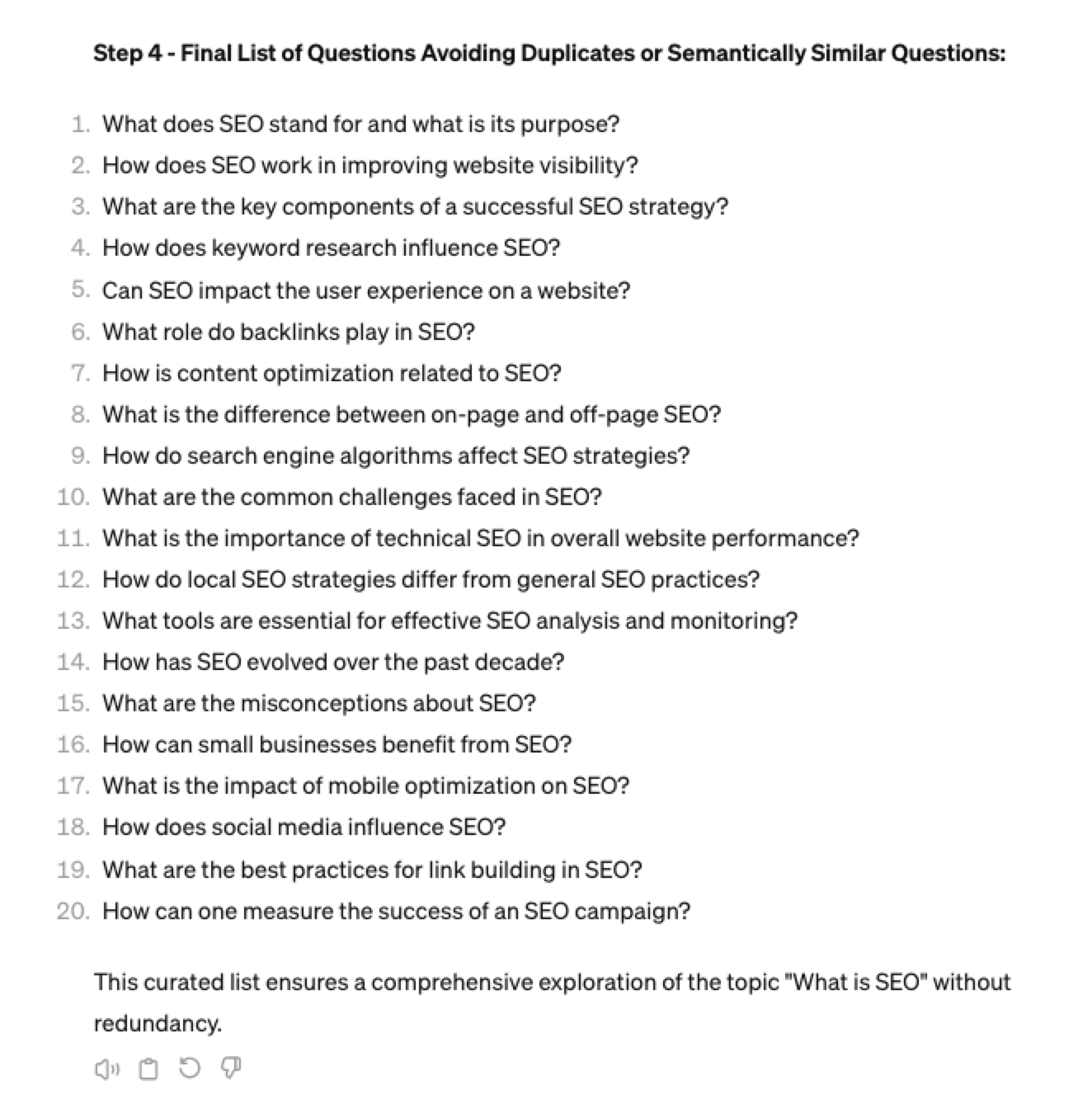 Screenshot ChatGPT 4, April 2024
Screenshot ChatGPT 4, April 2024Generating Keyword Ideas Using ChatGPT Based On The Alphabet Soup Method
One of my favorite methods, manually, without even using a keyword research tool, is to generate keyword research ideas from Google autocomplete, going from A to Z.
-
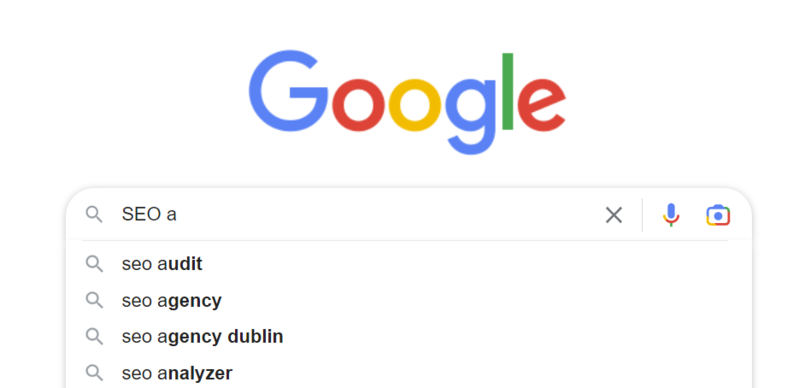 Screenshot from Google autocomplete, April 2024
Screenshot from Google autocomplete, April 2024
You can also do this using ChatGPT.
Example prompt:
“give me popular keywords that includes the keyword “SEO”, and the next letter of the word starts with a”
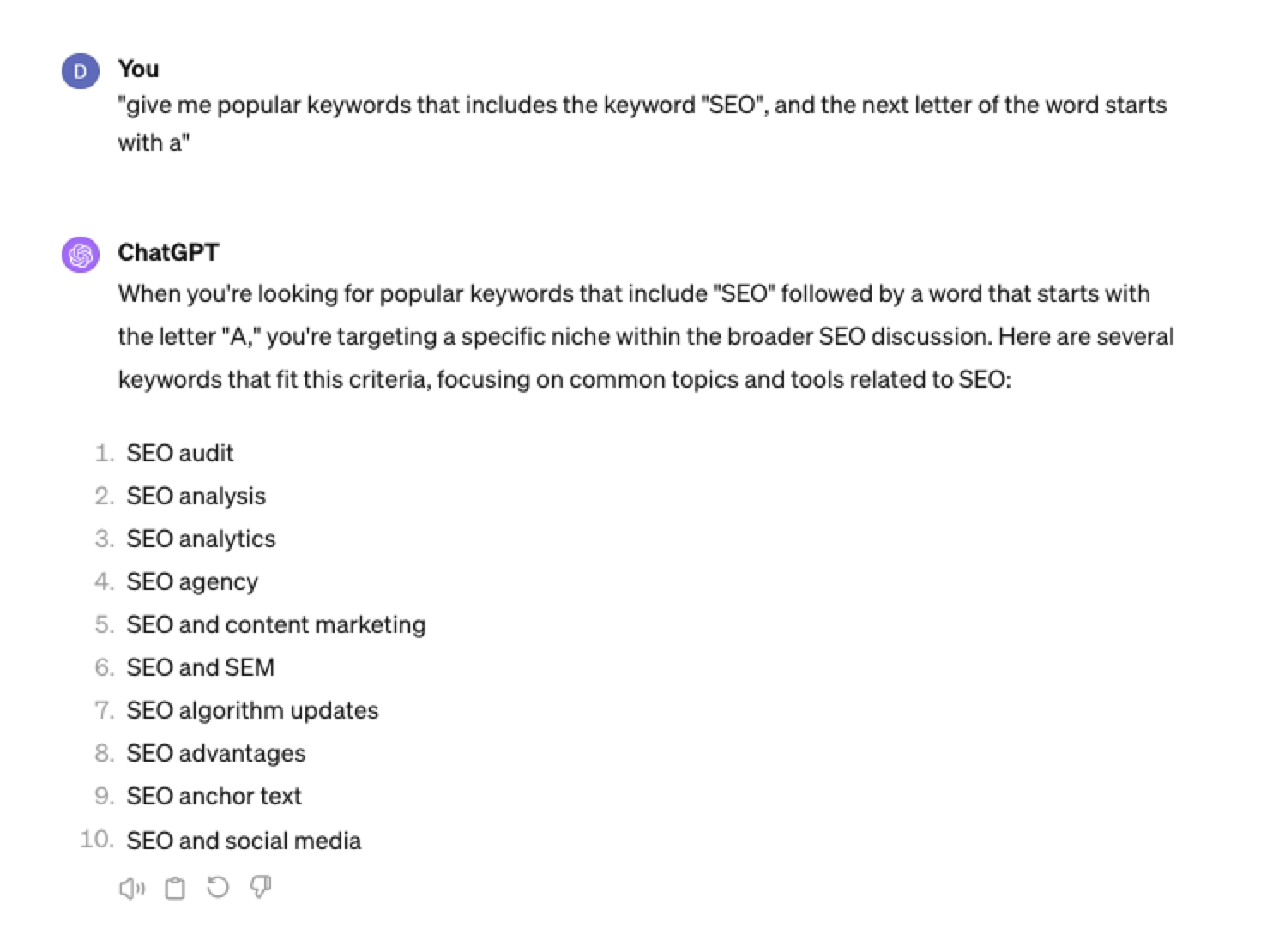 Screenshot from ChatGPT 4, April 2024
Screenshot from ChatGPT 4, April 2024Tip: Using the onion prompting method above, we can combine all this in one prompt.
“Give me five popular keywords that include “SEO” in the word, and the following letter starts with a. Once the answer has been done, move on to giving five more popular keywords that include “SEO” for each letter of the alphabet b to z.”
Generating Keyword Ideas Based On User Personas
When it comes to keyword research, understanding user personas is essential for understanding your target audience and keeping your keyword research focused and targeted. ChatGPT may help you get an initial understanding of customer personas.
Example prompt:
“For the topic of “{Topic}” list 10 keywords each for the different types of user personas”
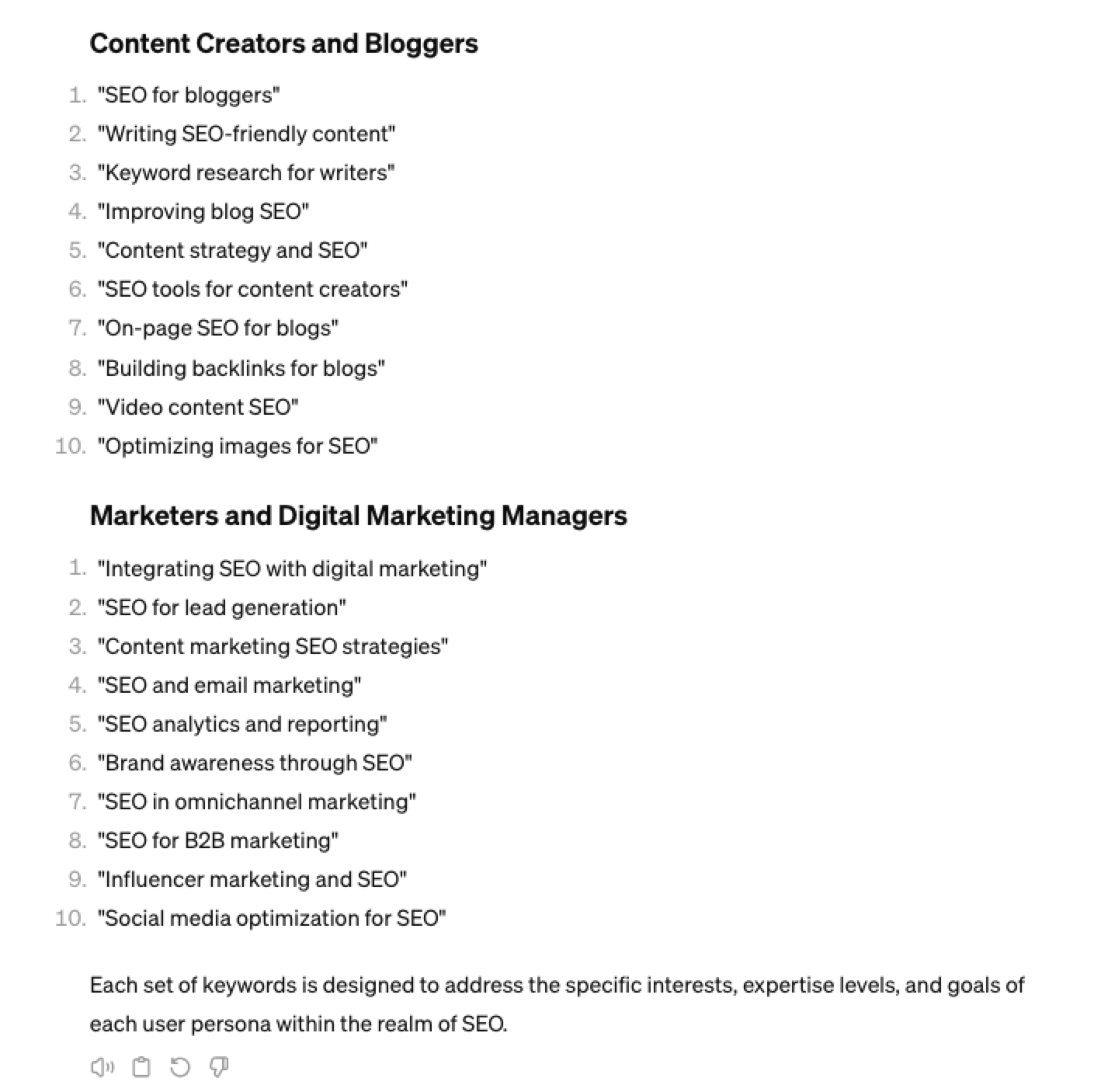 Screenshot from ChatGPT 4, April 2024
Screenshot from ChatGPT 4, April 2024You could even go a step further and ask for questions based on those topics that those specific user personas may be searching for:
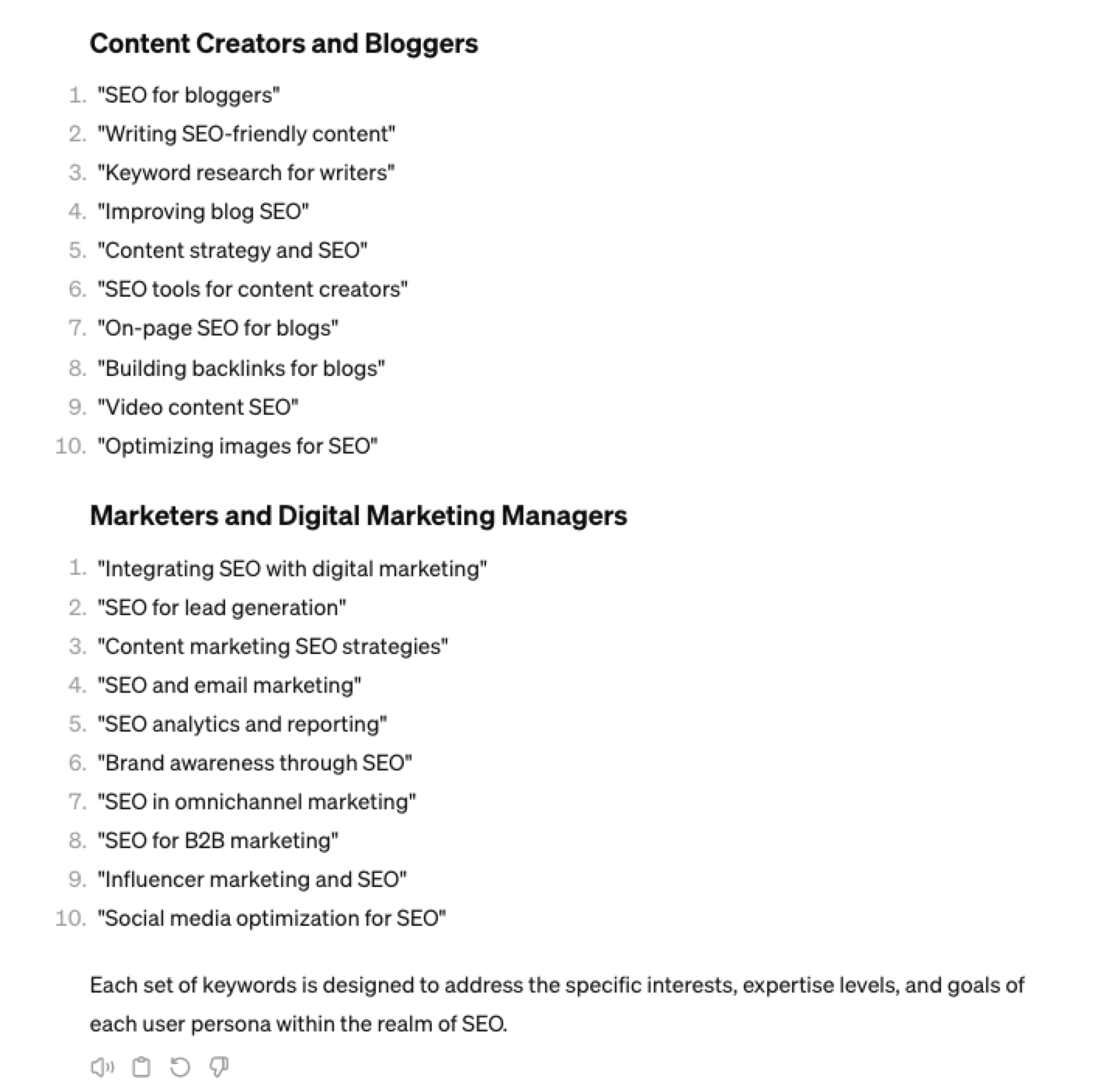 Screenshot ChatGPT 4, April 2024
Screenshot ChatGPT 4, April 2024As well as get the keywords to target based on those questions:
“For each question listed above for each persona, list the keywords, as well as the long-tail keywords to target, and put them in a table”
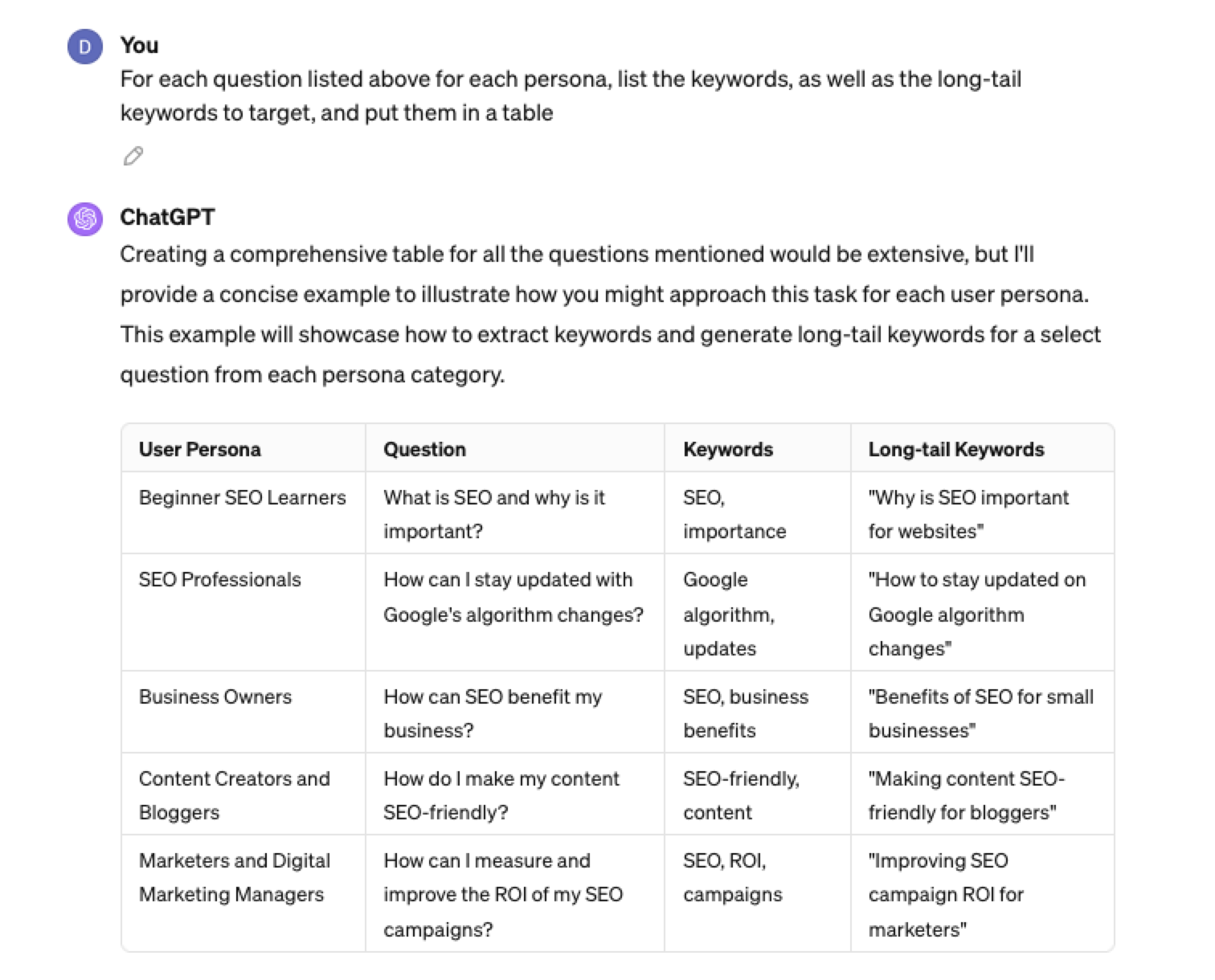 Screenshot from ChatGPT 4, April 2024
Screenshot from ChatGPT 4, April 2024Generating Keyword Ideas Using ChatGPT Based On Searcher Intent And User Personas
Understanding the keywords your target persona may be searching is the first step to effective keyword research. The next step is to understand the search intent behind those keywords and which content format may work best.
For example, a business owner who is new to SEO or has just heard about it may be searching for “what is SEO.”
However, if they are further down the funnel and in the navigational stage, they may search for “top SEO firms.”
You can query ChatGPT to inspire you here based on any topic and your target user persona.
SEO Example:
“For the topic of “{Topic}” list 10 keywords each for the different types of searcher intent that a {Target Persona} would be searching for”
ChatGPT For Keyword Research Admin
Here is how you can best use ChatGPT for keyword research admin tasks.
Using ChatGPT As A Keyword Categorization Tool
One of the use cases for using ChatGPT is for keyword categorization.
In the past, I would have had to devise spreadsheet formulas to categorize keywords or even spend hours filtering and manually categorizing keywords.
ChatGPT can be a great companion for running a short version of this for you.
Let’s say you have done keyword research in a keyword research tool, have a list of keywords, and want to categorize them.
You could use the following prompt:
“Filter the below list of keywords into categories, target persona, searcher intent, search volume and add information to a six-column table: List of keywords – [LIST OF KEYWORDS], Keyword Search Volume [SEARCH VOLUMES] and Keyword Difficulties [KEYWORD DIFFICUTIES].”
-
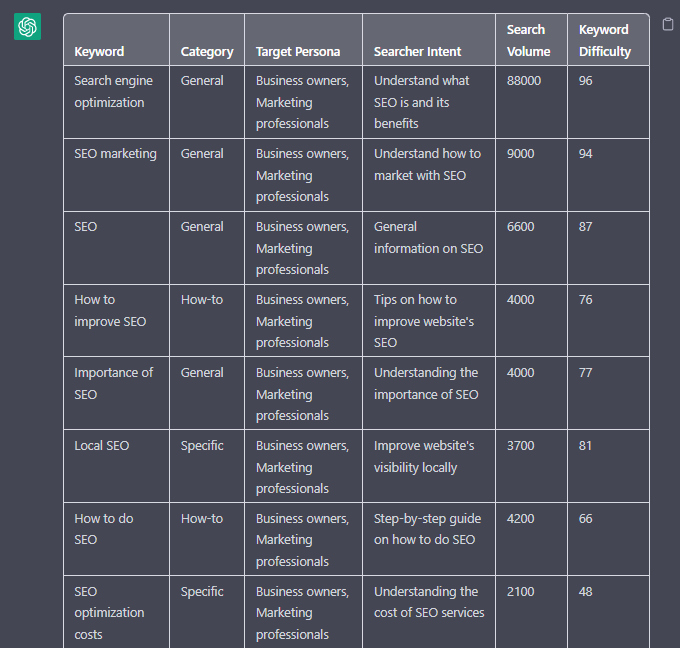 Screenshot from ChatGPT, April 2024
Screenshot from ChatGPT, April 2024
Tip: Add keyword metrics from the keyword research tools, as using the search volumes that a ChatGPT prompt may give you will be wildly inaccurate at best.
Using ChatGPT For Keyword Clustering
Another of ChatGPT’s use cases for keyword research is to help you cluster. Many keywords have the same intent, and by grouping related keywords, you may find that one piece of content can often target multiple keywords at once.
However, be careful not to rely only on LLM data for clustering. What ChatGPT may cluster as a similar keyword, the SERP or the user may not agree with. But it is a good starting point.
The big downside of using ChatGPT for keyword clustering is actually the amount of keyword data you can cluster based on the memory limits.
So, you may find a keyword clustering tool or script that is better for large keyword clustering tasks. But for small amounts of keywords, ChatGPT is actually quite good.
A great use small keyword clustering use case using ChatGPT is for grouping People Also Ask (PAA) questions.
Use the following prompt to group keywords based on their semantic relationships. For example:
“Organize the following keywords into groups based on their semantic relationships, and give a short name to each group: [LIST OF PAA], create a two-column table where each keyword sits on its own row.
-
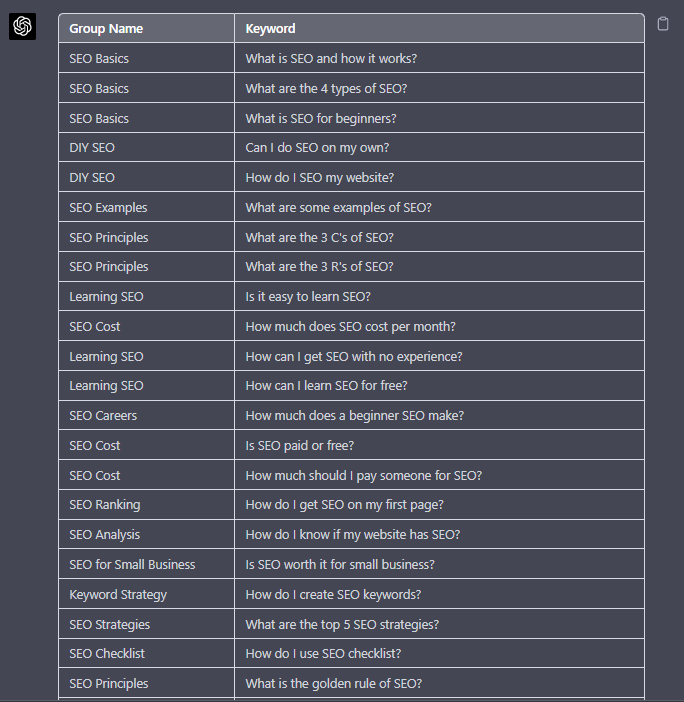 Screenshot from ChatGPT, April 2024
Screenshot from ChatGPT, April 2024
Using Chat GPT For Keyword Expansion By Patterns
One of my favorite methods of doing keyword research is pattern spotting.
Most seed keywords have a variable that can expand your target keywords.
Here are a few examples of patterns:
1. Question Patterns
(who, what, where, why, how, are, can, do, does, will)
“Generate [X] keywords for the topic “[Topic]” that contain any or all of the following “who, what, where, why, how, are, can, do, does, will”
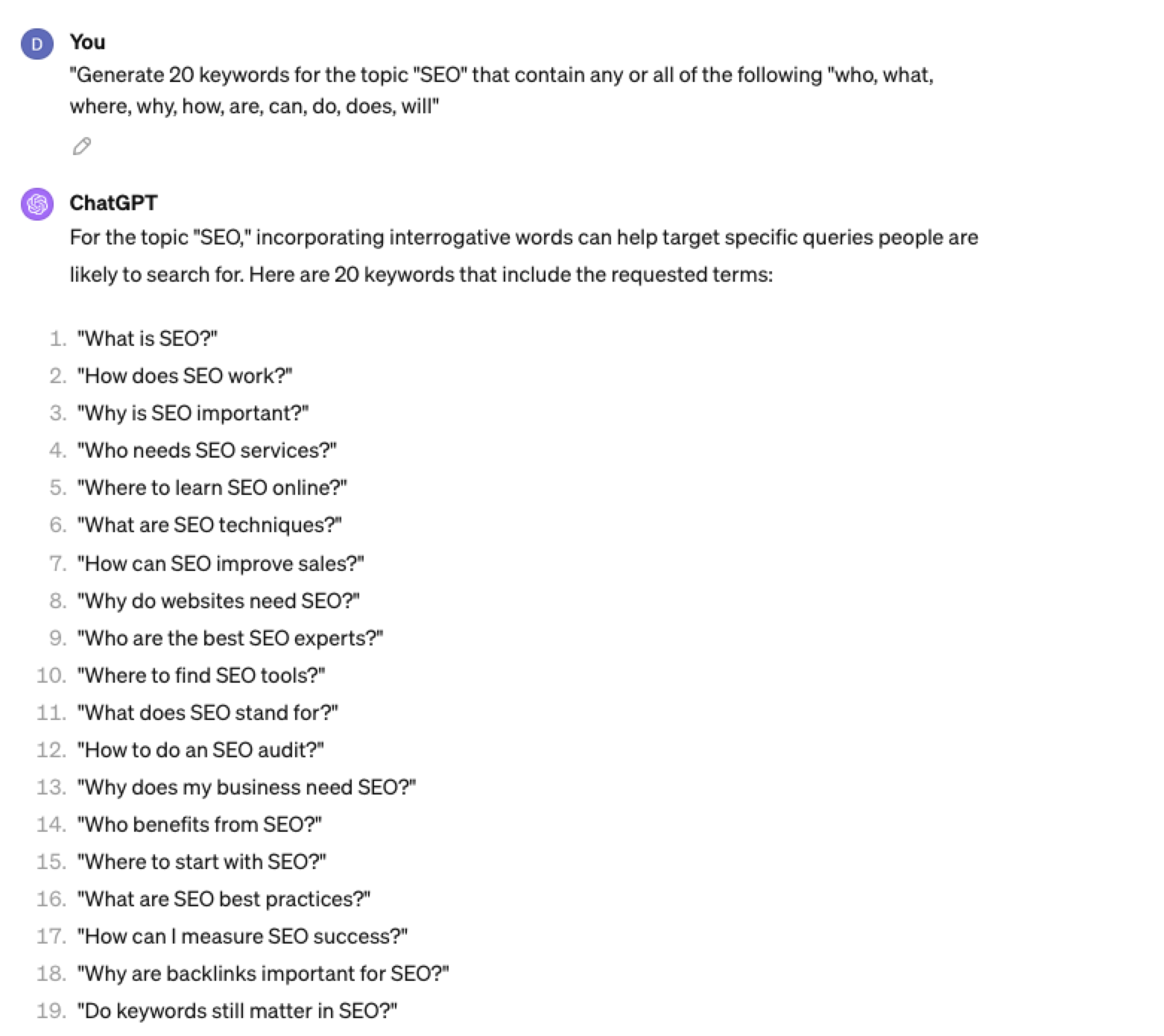 Screenshot ChatGPT 4, April 2024
Screenshot ChatGPT 4, April 20242. Comparison Patterns
Example:
“Generate 50 keywords for the topic “{Topic}” that contain any or all of the following “for, vs, alternative, best, top, review”
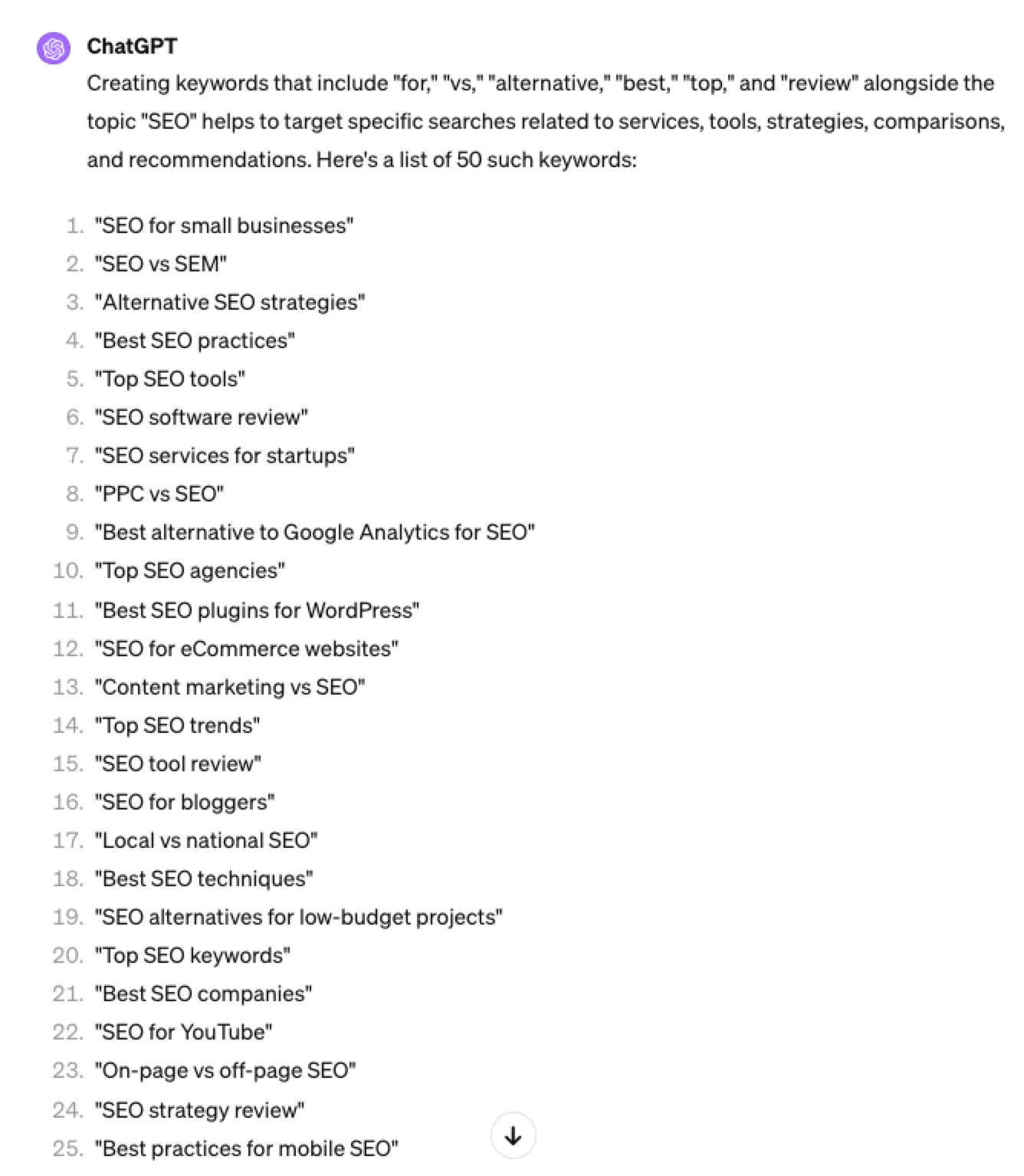 Screenshot ChatGPT 4, April 2024
Screenshot ChatGPT 4, April 20243. Brand Patterns
Another one of my favorite modifiers is a keyword by brand.
We are probably all familiar with the most popular SEO brands; however, if you aren’t, you could ask your AI friend to do the heavy lifting.
Example prompt:
“For the top {Topic} brands what are the top “vs” keywords”
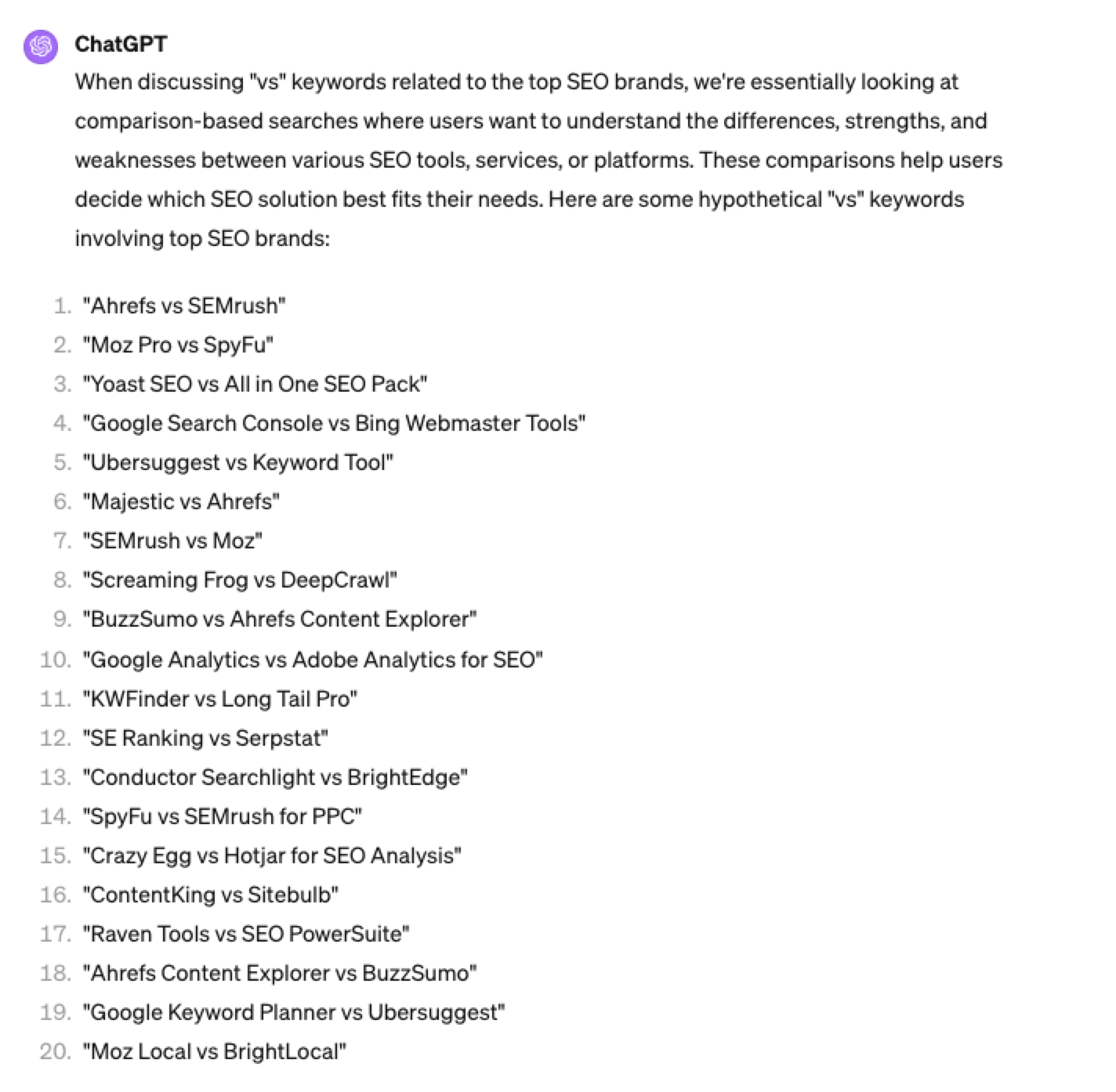 Screenshot ChatGPT 4, April 2024
Screenshot ChatGPT 4, April 20244. Search Intent Patterns
One of the most common search intent patterns is “best.”
When someone is searching for a “best {topic}” keyword, they are generally searching for a comprehensive list or guide that highlights the top options, products, or services within that specific topic, along with their features, benefits, and potential drawbacks, to make an informed decision.
Example:
“For the topic of “[Topic]” what are the 20 top keywords that include “best”
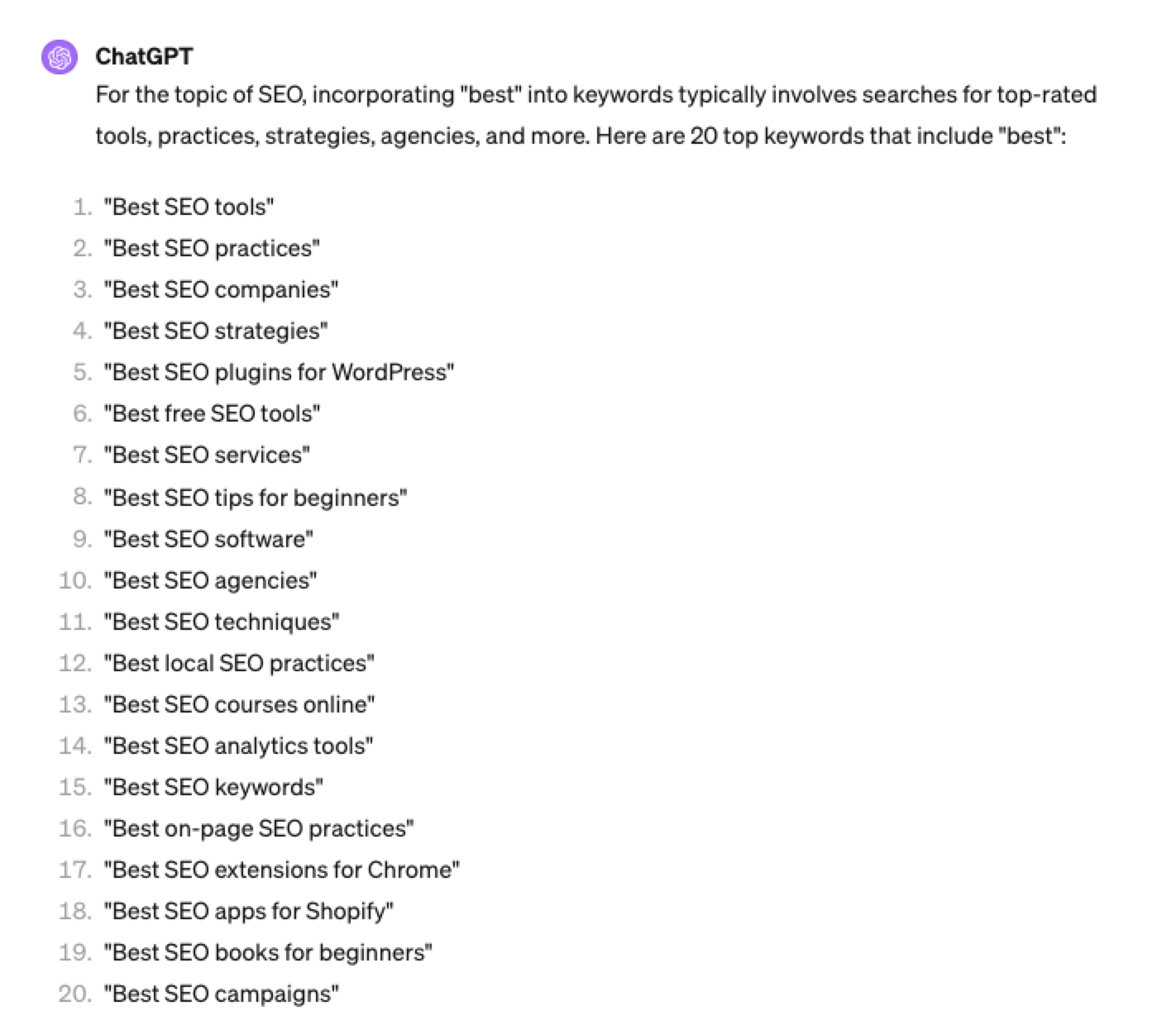 Screenshot ChatGPT 4, April 2024
Screenshot ChatGPT 4, April 2024Again, this guide to keyword research using ChatGPT has emphasized the ease of generating keyword research ideas by utilizing ChatGPT throughout the process.
Keyword Research Using ChatGPT Vs. Keyword Research Tools
Free Vs. Paid Keyword Research Tools
Like keyword research tools, ChatGPT has free and paid options.
However, one of the most significant drawbacks of using ChatGPT for keyword research alone is the absence of SEO metrics to help you make smarter decisions.
To improve accuracy, you could take the results it gives you and verify them with your classic keyword research tool – or vice versa, as shown above, uploading accurate data into the tool and then prompting.
However, you must consider how long it takes to type and fine-tune your prompt to get your desired data versus using the filters within popular keyword research tools.
For example, if we use a popular keyword research tool using filters, you could have all of the “best” queries with all of their SEO metrics:
-
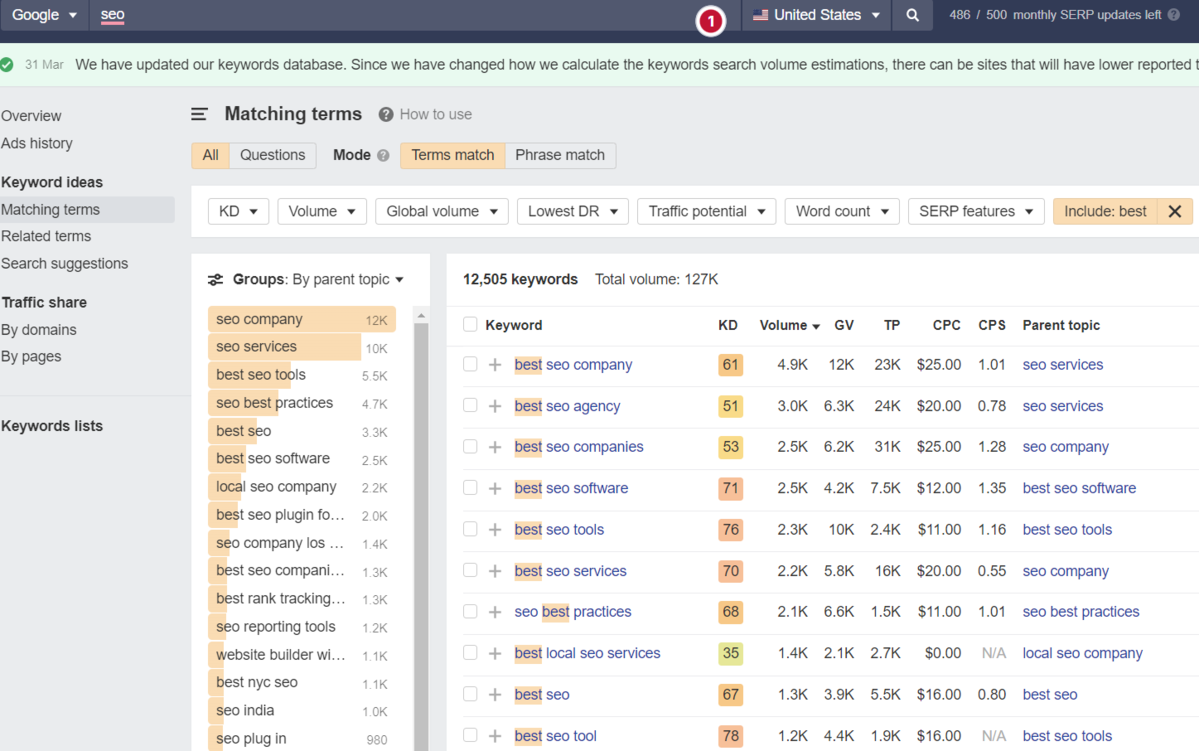 Screenshot from Ahrefs Keyword Explorer, March 2024
Screenshot from Ahrefs Keyword Explorer, March 2024
And unlike ChatGPT, generally, there is no token limit; you can extract several hundred, if not thousands, of keywords at a time.
As I have mentioned multiple times throughout this piece, you cannot blindly trust the data or SEO metrics it may attempt to provide you with.
The key is to validate the keyword research with a keyword research tool.
ChatGPT For International SEO Keyword Research
ChatGPT can be a terrific multilingual keyword research assistant.
For example, if you wanted to research keywords in a foreign language such as French. You could ask ChatGPT to translate your English keywords;
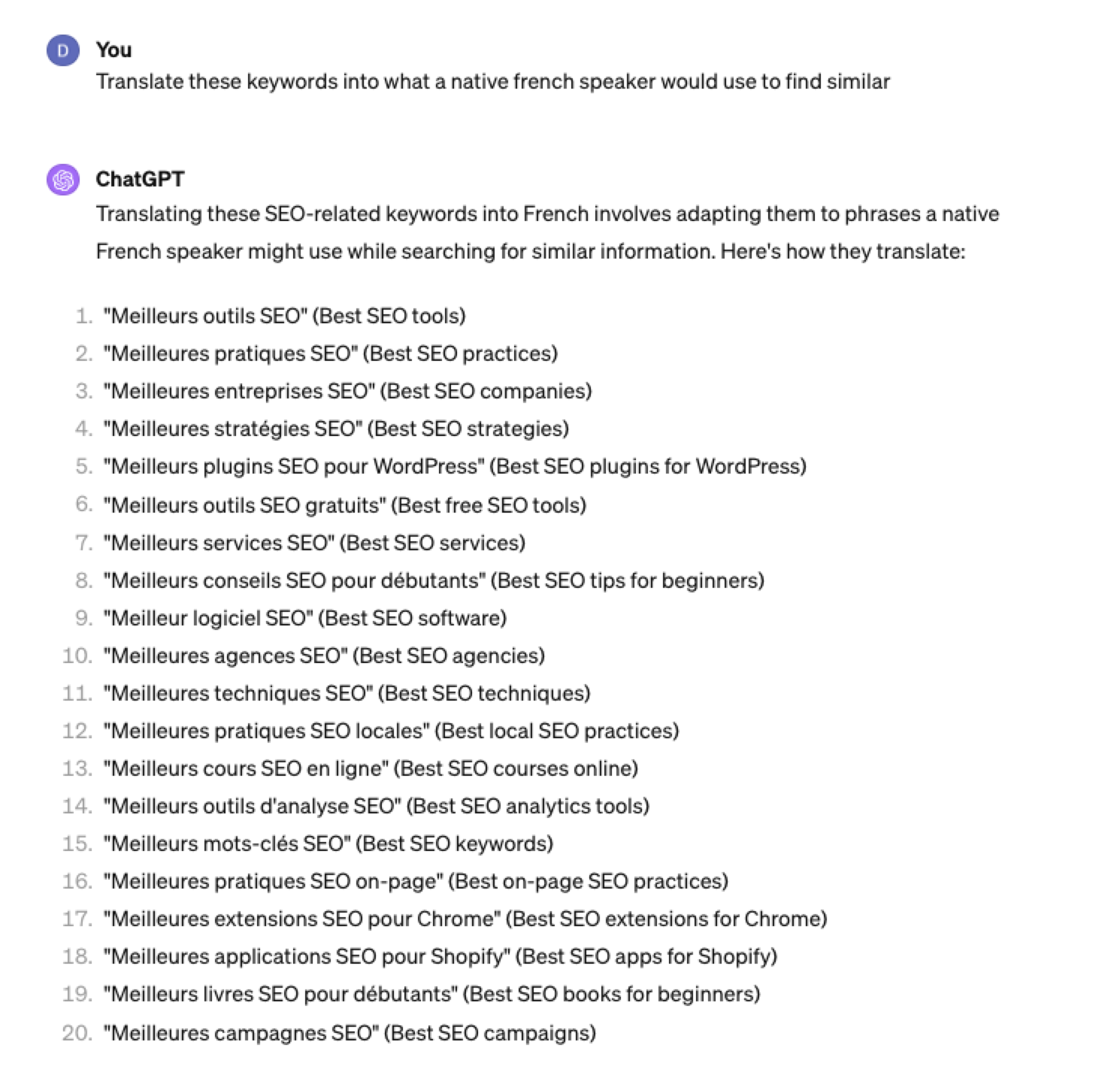 Screenshot ChatGPT 4, Apil 2024
Screenshot ChatGPT 4, Apil 2024- The key is to take the data above and paste it into a popular keyword research tool to verify.
- As you can see below, many of the keyword translations for the English keywords do not have any search volume for direct translations in French.
 Screenshot from Ahrefs Keyword Explorer, April 2024
Screenshot from Ahrefs Keyword Explorer, April 2024But don’t worry, there is a workaround: If you have access to a competitor keyword research tool, you can see what webpage is ranking for that query – and then identify the top keyword for that page based on the ChatGPT translated keywords that do have search volume.
-
-
 Screenshot from Ahrefs Keyword Explorer, April 2024
Screenshot from Ahrefs Keyword Explorer, April 2024
Or, if you don’t have access to a paid keyword research tool, you could always take the top-performing result, extract the page copy, and then ask ChatGPT what the primary keyword for the page is.
Key Takeaway
-
ChatGPT can be an expert on any topic and an invaluable keyword research tool. However, it is another tool to add to your toolbox when doing keyword research; it does not replace traditional keyword research tools.
As shown throughout this tutorial, from making up keywords at the beginning to inaccuracies around data and translations, ChatGPT can make mistakes when used for keyword research.
You cannot blindly trust the data you get back from ChatGPT.
However, it can offer a shortcut to understanding any topic for which you need to do keyword research and, as a result, save you countless hours.
But the key is how you prompt.
The prompts I shared with you above will help you understand a topic in minutes instead of hours and allow you to better seed keywords using keyword research tools.
It can even replace mundane keyword clustering tasks that you used to do with formulas in spreadsheets or generate ideas based on keywords you give it.
Paired with traditional keyword research tools, ChatGPT for keyword research can be a powerful tool in your arsenal.
More resources:
Featured Image: Tatiana Shepeleva/Shutterstock
SEO
OpenAI Expected to Integrate Real-Time Data In ChatGPT

Sam Altman, CEO of OpenAI, dispelled rumors that a new search engine would be announced on Monday, May 13. Recent deals have raised the expectation that OpenAI will announce the integration of real-time content from English, Spanish, and French publications into ChatGPT, complete with links to the original sources.
OpenAI Search Is Not Happening
Many competing search engines have tried and failed to challenge Google as the leading search engine. A new wave of hybrid generative AI search engines is currently trying to knock Google from the top spot with arguably very little success.
Sam Altman is on record saying that creating a search engine to compete against Google is not a viable approach. He suggested that technological disruption was the way to replace Google by changing the search paradigm altogether. The speculation that Altman is going to announce a me-too search engine on Monday never made sense given his recent history of dismissing the concept as a non-starter.
So perhaps it’s not a surprise that he recently ended the speculation by explicitly saying that he will not be announcing a search engine on Monday.
He tweeted:
“not gpt-5, not a search engine, but we’ve been hard at work on some new stuff we think people will love! feels like magic to me.”
“New Stuff” May Be Iterative Improvement
It’s quite likely that what’s going to be announced is iterative which means it improves ChatGPT but not replaces it. This fits into how Altman recently expressed his approach with ChatGPT.
He remarked:
“And it does kind of suck to ship a product that you’re embarrassed about, but it’s much better than the alternative. And in this case in particular, where I think we really owe it to society to deploy iteratively.
There could totally be things in the future that would change where we think iterative deployment isn’t such a good strategy, but it does feel like the current best approach that we have and I think we’ve gained a lot from from doing this and… hopefully the larger world has gained something too.”
Improving ChatGPT iteratively is Sam Altman’s preference and recent clues point to what those changes may be.
Recent Deals Contain Clues
OpenAI has been making deals with news media and User Generated Content publishers since December 2023. Mainstream media has reported these deals as being about licensing content for training large language models. But they overlooked a a key detail that we reported on last month which is that these deals give OpenAI access to real-time information that they stated will be used to give attribution to that real-time data in the form of links.
That means that ChatGPT users will gain the ability to access real-time news and to use that information creatively within ChatGPT.
Dotdash Meredith Deal
Dotdash Meredith (DDM) is the publisher of big brand publications such as Better Homes & Gardens, FOOD & WINE, InStyle, Investopedia, and People magazine. The deal that was announced goes way beyond using the content as training data. The deal is explicitly about surfacing the Dotdash Meredith content itself in ChatGPT.
The announcement stated:
“As part of the agreement, OpenAI will display content and links attributed to DDM in relevant ChatGPT responses. …This deal is a testament to the great work OpenAI is doing on both fronts to partner with creators and publishers and ensure a healthy Internet for the future.
Over 200 million Americans each month trust our content to help them make decisions, solve problems, find inspiration, and live fuller lives. This partnership delivers the best, most relevant content right to the heart of ChatGPT.”
A statement from OpenAI gives credibility to the speculation that OpenAI intends to directly show licensed third-party content as part of ChatGPT answers.
OpenAI explained:
“We’re thrilled to partner with Dotdash Meredith to bring its trusted brands to ChatGPT and to explore new approaches in advancing the publishing and marketing industries.”
Something that DDM also gets out of this deal is that OpenAI will enhance DDM’s in-house ad targeting in order show more tightly focused contextual advertising.
Le Monde And Prisa Media Deals
In March 2024 OpenAI announced a deal with two global media companies, Le Monde and Prisa Media. Le Monde is a French news publication and Prisa Media is a Spanish language multimedia company. The interesting aspects of these two deals is that it gives OpenAI access to real-time data in French and Spanish.
Prisa Media is a global Spanish language media company based in Madrid, Spain that is comprised of magazines, newspapers, podcasts, radio stations, and television networks. It’s reach extends from Spain to America. American media companies include publications in the United States, Argentina, Bolivia, Chile, Colombia, Costa Rica, Ecuador, Mexico, and Panama. That is a massive amount of real-time information in addition to a massive audience of millions.
OpenAI explicitly announced that the purpose of this deal was to bring this content directly to ChatGPT users.
The announcement explained:
“We are continually making improvements to ChatGPT and are supporting the essential role of the news industry in delivering real-time, authoritative information to users. …Our partnerships will enable ChatGPT users to engage with Le Monde and Prisa Media’s high-quality content on recent events in ChatGPT, and their content will also contribute to the training of our models.”
That deal is not just about training data. It’s about bringing current events data to ChatGPT users.
The announcement elaborated in more detail:
“…our goal is to enable ChatGPT users around the world to connect with the news in new ways that are interactive and insightful.”
As noted in our April 30th article that revealed that OpenAI will show links in ChatGPT, OpenAI intends to show third party content with links to that content.
OpenAI commented on the purpose of the Le Monde and Prisa Media partnership:
“Over the coming months, ChatGPT users will be able to interact with relevant news content from these publishers through select summaries with attribution and enhanced links to the original articles, giving users the ability to access additional information or related articles from their news sites.”
There are additional deals with other groups like The Financial Times which also stress that this deal will result in a new ChatGPT feature that will allow users to interact with real-time news and current events .
OpenAI’s Monday May 13 Announcement
There are many clues that the announcement on Monday will be that ChatGPT users will gain the ability to interact with content about current events. This fits into the terms of recent deals with news media organizations. There may be other features announced as well but this part is something that there are many clues pointing to.
Watch Altman’s interview at Stanford University
Featured Image by Shutterstock/photosince
SEO
Google’s Strategies For Dealing With Content Decay

In the latest episode of the Search Off The Record podcast, Google Search Relations team members John Mueller and Lizzi Sassman did a deep dive into dealing with “content decay” on websites.
Outdated content is a natural issue all sites face over time, and Google has outlined strategies beyond just deleting old pages.
While removing stale content is sometimes necessary, Google recommends taking an intentional, format-specific approach to tackling content decay.
Archiving vs. Transitional Guides
Google advises against immediately removing content that becomes obsolete, like materials referencing discontinued products or services.
Removing content too soon could confuse readers and lead to a poor experience, Sassman explains:
“So, if I’m trying to find out like what happened, I almost need that first thing to know. Like, “What happened to you?” And, otherwise, it feels almost like an error. Like, “Did I click a wrong link or they redirect to the wrong thing?””
Sassman says you can avoid confusion by providing transitional “explainer” pages during deprecation periods.
A temporary transition guide informs readers of the outdated content while steering them toward updated resources.
Sassman continues:
“That could be like an intermediary step where maybe you don’t do that forever, but you do it during the transition period where, for like six months, you have them go funnel them to the explanation, and then after that, all right, call it a day. Like enough people know about it. Enough time has passed. We can just redirect right to the thing and people aren’t as confused anymore.”
When To Update Vs. When To Write New Content
For reference guides and content that provide authoritative overviews, Google suggests updating information to maintain accuracy and relevance.
However, for archival purposes, major updates may warrant creating a new piece instead of editing the original.
Sassman explains:
“I still want to retain the original piece of content as it was, in case we need to look back or refer to it, and to change it or rehabilitate it into a new thing would almost be worth republishing as a new blog post if we had that much additional things to say about it.”
Remove Potentially Harmful Content
Google recommends removing pages in cases where the outdated information is potentially harmful.
Sassman says she arrived at this conclusion when deciding what to do with a guide involving obsolete structured data:
“I think something that we deleted recently was the “How to Structure Data” documentation page, which I thought we should just get rid of it… it almost felt like that’s going to be more confusing to leave it up for a period of time.
And actually it would be negative if people are still adding markup, thinking they’re going to get something. So what we ended up doing was just delete the page and redirect to the changelog entry so that, if people clicked “How To Structure Data” still, if there was a link somewhere, they could still find out what happened to that feature.”
Internal Auditing Processes
To keep your content current, Google advises implementing a system for auditing aging content and flagging it for review.
Sassman says she sets automated alerts for pages that haven’t been checked in set periods:
“Oh, so we have a little robot to come and remind us, “Hey, you should come investigate this documentation page. It’s been x amount of time. Please come and look at it again to make sure that all of your links are still up to date, that it’s still fresh.””
Context Is Key
Google’s tips for dealing with content decay center around understanding the context of outdated materials.
You want to prevent visitors from stumbling across obsolete pages without clarity.
Additional Google-recommended tactics include:
- Prominent banners or notices clarifying a page’s dated nature
- Listing original publish dates
- Providing inline annotations explaining how older references or screenshots may be obsolete
How This Can Help You
Following Google’s recommendations for tackling content decay can benefit you in several ways:
- Improved user experience: By providing clear explanations, transition guides, and redirects, you can ensure that visitors don’t encounter confusing or broken pages.
- Maintained trust and credibility: Removing potentially harmful or inaccurate content and keeping your information up-to-date demonstrates your commitment to providing reliable and trustworthy resources.
- Better SEO: Regularly auditing and updating your pages can benefit your website’s search rankings and visibility.
- Archival purposes: By creating new content instead of editing older pieces, you can maintain a historical record of your website’s evolution.
- Streamlined content management: Implementing internal auditing processes makes it easier to identify and address outdated or problematic pages.
By proactively tackling content decay, you can keep your website a valuable resource, improve SEO, and maintain an organized content library.
Listen to the full episode of Google’s podcast below:
Featured Image: Stokkete/Shutterstock
-

 PPC5 days ago
PPC5 days agoHow the TikTok Algorithm Works in 2024 (+9 Ways to Go Viral)
-

 MARKETING7 days ago
MARKETING7 days agoA Recap of Everything Marketers & Advertisers Need to Know
-

 SEO4 days ago
SEO4 days agoHow to Use Keywords for SEO: The Complete Beginner’s Guide
-

 SEO6 days ago
SEO6 days agoBlog Post Checklist: Check All Prior to Hitting “Publish”
-

 MARKETING5 days ago
MARKETING5 days agoHow To Protect Your People and Brand
-

 SEARCHENGINES6 days ago
SEARCHENGINES6 days agoGoogle Started Enforcing The Site Reputation Abuse Policy
-

 PPC6 days ago
PPC6 days agoHow to Craft Compelling Google Ads for eCommerce
-

 MARKETING6 days ago
MARKETING6 days agoElevating Women in SEO for a More Inclusive Industry




















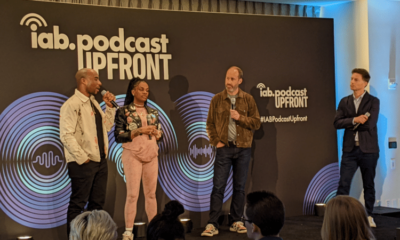







You must be logged in to post a comment Login